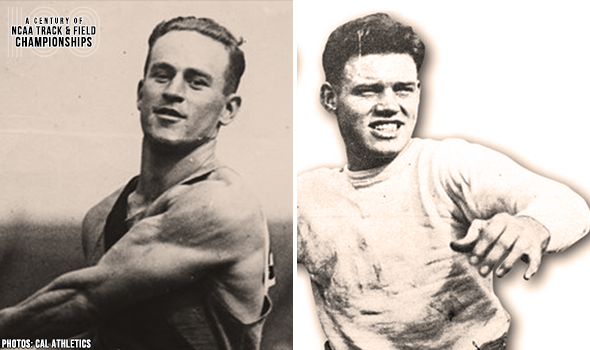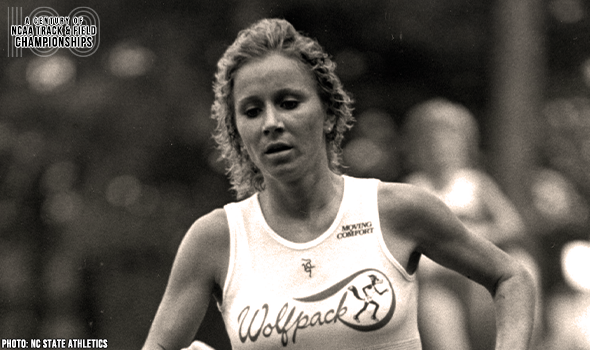
Jenkins Set Low-Altitude Meet Best In 1999
LaTasha Jenkins of Ball State ran the 200 meters at the 1999 NCAA Division I Outdoor Track & Field Championships in Boise, Idaho, much the way she might have written one of her short stories – with a great ending.
Jenkins was a senior English major with a penchant for fiction, but her final race for the Cardinals didn’t exactly start off as a masterpiece.
“She had the world’s worst start,” Ball State coach Kelly Lycan told the Star Press of hometown Muncie, Indiana.
Jenkins threw in a major twist on the homestretch when she caught defending champion Debbie Ferguson of Georgia near the midpoint and stormed home to a solid victory in 22.29, becoming the first women’s NCAA champion for Ball State in any sport.
Her time was a stunner, too, matching Nebraska’s Merlene Ottey from 1982 and behind only Dawn Sowell of LSU (22.04 in 1989) on the all-time list.
It wasn’t just that she won the NCAA title, Lycan explained to David Woods for Track & Field News. “It was more the way she did it. She made the crowd go ‘oooh’.”
“I’m not that surprised,” said Jenkins. “I think I was just happy and relieved that I was capable of doing it. Just showing the world that small schools are just as fast.”
The NCAA and collegiate track & field will mark a momentous milestone in the spring of 2021 -- the 100th anniversary of the NCAA Championships and with that, the NCAA Track & Field Championships. In June 1921, the University of Chicago hosted the first track & field championships in NCAA history.
This point can’t be emphasized enough: Not only was the event the first for NCAA track & field, but the first championships for any sport under the sponsorship of the NCAA.
To celebrate, over each of the next 365 days, the U.S. Track & Field and Cross Country Coaches Association (USTFCCCA) will celebrate moments, student-athletes, and coaches that have made a century’s worth of championships special. From humble beginnings to important historical milestones to the modern-day, collegiate track & field has evolved with the American society.
The 2021 edition of the NCAA Division I Outdoor Track & Field Championships begin with preliminary round action on May 27-29 in Jacksonville, Fla., and College Station, Texas. The championships final site and culmination of the celebration is slated for June 9-12, 2021 at the newly rebuilt Hayward Field in Eugene, Ore.

Merchant, Muller Led Cal’s Field Day In 1922
Jack Merchant and Harold Muller combined for six top-5 finishes in five field events at the 1922 NCAA Outdoor Track & Field Championships.

NC State’s Springs Doubles Up Distance Titles
In 1983, Betty Springs became the first woman in the history of the NCAA Division I Outdoor Track & Field Championships to sweep the 5K/10K titles.

“Marvelous Mal” Whitfield Stars Over Two Laps
“Marvelous” Mal Whitfield won back-to-back NCAA 800-meter/880-yard titles in 1948 and 1949.

Ewen Was A True Triple Threat At NCAAs
Maggie Ewen is the only woman in the history of the NCAA Division I Outdoor Track & Field Championships with titles in three different throwing events.

Wanamaker Wins Inaugural Decathlon Title
Rick Wanamaker of Drake won the first-ever decathlon title at the NCAA Division I Outdoor Track & Field Championships in 1970!

SMU’s Connor Bounds To Triple Jump Greatness
It’s been 38 years and still no one has broken the meet record Keith Connor of SMU set in the triple jump at the 1982 NCAA Division I Outdoor Track & Field Championships in Provo, Utah.

Hail Lorenzo! Daniel Sprints To 200-Meter Records
Lorenzo Daniel of Mississippi State made four consecutive appearances in the final of the Men’s 200 Meters and set a collegiate and meet record in his last race.

Talented Twins Dominate Pole Vault Podium
Twin sisters Lexi Jacobus and Tori Hoggard finished on the same podium five times in eight seasons at the NCAA Championships and each won an outdoor title.

Blozis Was A “Giant” In The Shot
“Giant” Al Blozis won three consecutive shot put titles at the NCAA Outdoor Championships between 1940 and 1942.

Cameron Came Close To Standing Alone
Two one-hundredths of a second separated Bert Cameron of UTEP from standing alone in NCAA history.

